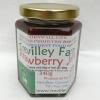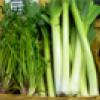The dry weather we have had recently has enabled Farmer Jim to finally cut the grass to be made into hay and silage. Normally, this would have be done in June, but the wet summer has prevented him from doing so before now.
Farmer Jim has also finished the harvest and bailing the straw.
We have a new rare breed of cattle on the farm for sale in the shop – Galloways. They are small and hardy animals originating from Galloway in Scotland and are one of the world’s longest established breeds of beef cattle.
We also have one Highland cattle – he has the horns and is in between the two Galloways.
Note their distinctive thick and shaggy coat for warmth. They also have stiffer guard hairs that help shed water.
The Galloway beef is available now from the shop. They are priced the same as our South Devon / Angus beef and are hung on the bone for at least two weeks.
As they are smaller animals, the varying cuts tend to be smaller – the joints are smaller in diameter, but this means you can get more slices off it.
We think the meat is softer and slighter richer.
Our Galloways were bred on Bodmin Moor. We have only the unwanted male cattle as the females are kept for breeding purposes. Unlike most cattle, they are hefted animals; they will return to home ground and not wander to distant corners of the moors.
Cattle have grazed on Bodmin Moor since the middle ages. In 1965 the Commons Registration Act (CRA) was passed in an effort to manage stock on common ground. New government ideas now include a reduction of stock on the moors. This is in response to claims of over-grazing. Over-grazing may result in “unimproved grassland at the expense of heathland and more diverse vegetation” (English Nature, Bodmin Moor Natural Area Profile) and impact on the wildlife that inhabits the moors. Eg bird numbers – especially Stonechats and Skylarks.
However, imposed restrictions on grazing will result in farm units, that are already struggling, becoming increasingly uneconomic, land would go out of production and the moors would be covered in gorse and scrub, making them inaccessible to people and livestock alike. This would also have a similarly detrimental effect on wildlife on the moors. A balance must be met.
In the shop, we hope to see some of our own sweetcorn available for sale soon, unless the weather turns wet again.
We have started picking some of our kale for the shop and also savoy cabbages and parsnips.
Clare has been busy making autumn pickles and preserves.
Burt’s Crisps have made a range of crisps using Cornish crisps from the ‘Golden Mile’ near Penzance. The area is in the path of the Gulf Stream and so rarely gets frost, enabling them to plant and harvest throughout the winter.
Mr John Wallis, who has a contract with Burt’s to supply 30 tonnes of Lady Rosetta potatoes, has described it as an “absolute godsend”.
"Without them, and other firms like them who specialise in niche markets, I doubt that my farm would be here in five years time.”
Jonty White, managing director of Burt’s Crisps, said: "Growers like John Wallis are in need of immediate practical help if they are to continue farming.
”This is just the first year and we hope to be able to work with many more local growers in the Cornwall's Golden Mile in the future."
Despite Burt’s being a company from ‘across the river’ in Devon, we will be stocking this particular range. Good news for all!
Also definitely worth a try, perhaps for a special occasion, is Bosue Vineyard’s methode traditionelle Sparkling wine. It is made from 2006 Orion grapes.





